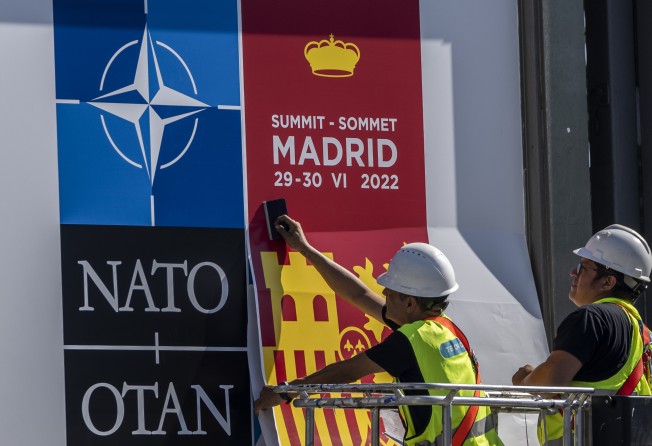Nato is set to become Asia’s powder keg problem
- The eastward expansion of the Western military alliance in Europe helped create the situation in Ukraine today. Now it wants carte blanche for global operations because of China – a disaster waiting to happen in Asia

Nato needs to be renamed. It should soon be called the North Atlantic and Pacific Treaty Organization. After all, every great organisation needs a name that is fit for purpose, and Nato has been having an identity crisis for almost three decades now. Where would it be without Russia, and now China?
By the end of its annual summit this week, the world’s most formidable military grouping will adopt a new strategic doctrine against China. Current and former bosses of the North Atlantic Treaty Organization have been preparing the public for the radical shift.
Nato chief Jens Stoltenberg last week declared: “China is openly contesting the rules-based international order.”
James Stavridis, former supreme allied commander of Nato who contributed to the formulation of the last major “strategic concept” or doctrine in 2010, said China would be cited in the new strategic overhaul.
He wrote in Bloomberg: “Unlike in 2010, this long-term plan will describe China as a strategic competitor. [Nato] must be capable of addressing concerns in cyberspace, human rights and territorial claims in the South China Sea – including consideration of Nato undertaking freedom of navigation patrols.
“The updated document will also likely emphasise cooperation globally with non-Nato democracies including Australia, Japan and South Korea.”
Russia and Nato
I have no trouble admitting Vladimir Putin is a militaristic autocrat whose 19th-century imperialist view on eastern Europe as being within Russia’s God-given sphere of influence is dangerous and threatening, not to say immoral and criminal.
But it takes two to tango. Both Russia and Nato are the problem in Europe. Unlike the Soviet Warsaw Pact, which was on the side of the Cold War loser and was disbanded, Nato membership just kept on expanding and expanding. Was there a rationale for it? Russia, of course. But that’s actually a circular argument.
Consider the sequence of admission of recent Nato members, all former Soviet satellites or Warsaw Pact allies: the Czech Republic, Hungary and Poland in 1999; Bulgaria, Romania, Slovenia and Slovakia, and all three Baltic states (Estonia, Latvia, Lithuania) in 2004; and Croatia and Albania in 2009. And then both Georgia and Ukraine have been clamouring for admission, and their militaries have already been converted to become compatible with Nato’s command system structures, including some weapon systems.
For sure, Nato says it is no threat to Russia. Funny thing is, all those new member states joined precisely and only because of Russia. You don’t need to be a paranoid autocrat with delusions of imperialist grandeur; you just need to be sitting in Moscow to consider the Nato expansion as, possibly, maybe, a very real genuine security threat, Nato denial notwithstanding.
In November, George Robertson, Stoltenberg’s Nato predecessor, acknowledged that Putin openly asked for Nato admission. But he was told off. To the victor, all the spoils; and Russia was the big loser in the Cold War. But imagine if Nato had allowed for informal partnership, if not full membership, with Moscow. At the very least, there would have been no excuses for Russian revanchism. But then, without Russia as a threat, what would be the point or raison d’être of Nato?
China and Nato
Nato has gone eyeball to eyeball with Russia, and the world is now in dire straits as a result. Does it want to do the same with China?
At least its eastern expansion in state membership has been in Europe. Operationally, though, Nato has been deploying “out of area” under the doctrine of “forward presence”, which replaced “forward defence” during the Cold War. Under this expansionist policy, it has operated against Serbia in 1999, joined the United States after its invasion of Afghanistan in 2001 and again in Libya in 2011. Nato forces also ended up operating off the Horn of Africa to fight pirates.
There are no geographic limits to Nato’s “forward presence”. Given those precedents, expanding operations into Asia and the Pacific could well be justified. It does call into question, though, its institutional mandate and legitimacy. Is it to become the military policeman of the world?
Stavridis said: “Nato must be capable of addressing concerns in cyberspace, human rights and territorial claims in the South China Sea – including consideration of Nato undertaking freedom of navigation patrols.” But why Nato and not some other international body, military or civilian? What about leaving Asia to Asian countries, which prefer trade and diplomacy over warplanes and warships in their neighbourhood?
Granted, Stavridis is not a Nato official any more. But presumably, he knows what’s going on. Nato in the South China Sea? The Quad (with the United States, India, Japan and Australia) and Aukus (with the US, Britain and Australia) aren’t enough, not to mention long-standing formal military alliances of the US with South Korea and Japan respectively? The West just needs an overkill in Asia with China.
Why does Washington want Nato in Asia? Call me simplistic or cynical, but there seems to be two simple reasons. Nato gives America’s anti-China policy and its increasingly overtly militaristic overtone in the Pacific a diplomatic cover, even if that means delegitimising Nato.
And Washington knows how hard it would be, if not impossible, to form an “Asian Nato”. Except for Japan, most of the US’ partners and allies in Asia are far too sensible and risk-averse for that.
If you care about peace and stability in Asia, you should call on Nato to stay out.